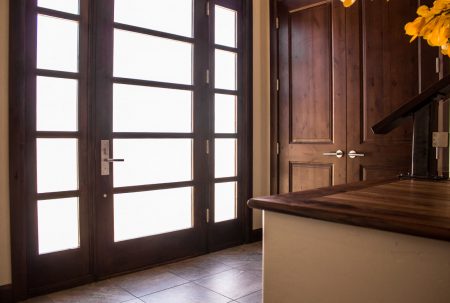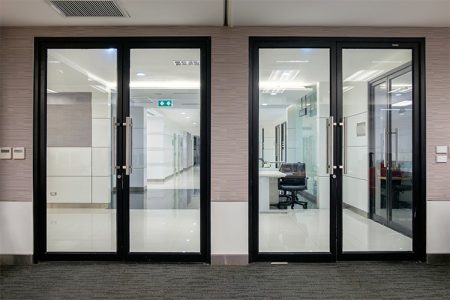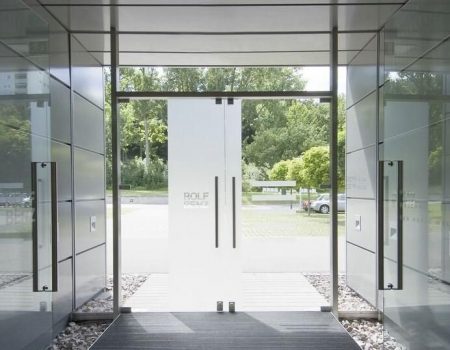Glass architectural features and partition walls are becoming increasingly common in modern workplaces. At the same time, it fosters an open and creative workplace culture and does not compromise the employee’s right to privacy. Both customers and employees are greeted by visually striking and memorable aspects of the building’s architecture. In addition to its aesthetic benefits, its appearance also benefits in terms of its long-term strength, durability, and safety.
Why use glass partition walls?
Glass partition walls are quickly becoming an essential component of the design of today’s modern workplaces. They are famous for various commercial settings due to their adaptability and aesthetically pleasing appearance. These partitions almost often include tempered or laminated glass in their construction. Partitions can be assembled into various layouts and are a valuable tool for newly founded businesses and established corporations. This is primarily due to the adaptability of these partitions. They have a formal but free-flowing tone, making them easily adaptable to any setting.
What is the difference between single-glazed and double-glazed partitions?
Single glazed partitions consist of a single sheet of glass, which commonly ranges in thickness from 3mm to 10mm. Most single-glazed partitions are frameless (panels are separated by transparent joints, as opposed to aluminium mullions) and may have a minimalistic appearance, providing a more visually attractive appearance and a modern vibe.
Double glazed walls and doors consist of two layers of glass. These are separated by a space between 12mm and 16mm wide, but in contemporary double glazing, the space is often 20mm. The two panes will typically have a thickness of 4 mm, making the total thickness of the sealed unit roughly 28 mm. The panels may be framed or unframed depending on the partition method employed. Typically, double-glazed walls are used when noise reduction and seclusion are essential. Some double-glazed frame systems provide the installation of internal blinds between the two panes, enhancing privacy and insulation.
How much are glass partition walls?
For installing a glass partition wall, you should budget between £80 and £120 per square metre; this is for the primary product and varies widely depending on who you pick to conduct the installation. Calculating the cost of frameless partitions without first establishing the specific application being used is not a precise science. The price of installing a glass door might range anywhere from £1,000 to £3,000. The hourly labour cost might vary anywhere from $35 to $150, depending on the locality.
The cost of a glass wall may be affected by various factors. To prevent a house from becoming too warm during the summer, a southern-facing wall, for instance, could need a roof overhang of up to three feet in length. Additionally, specific systems may need double or triple windows to limit solar exposure.
Which are the best glass doors to use?
The market is stocked with a wide selection of different types of glass doors. There are so many other options to choose from that discussing them all at once would be pretty daunting. Instead of doing that, we’ll provide you with an overview of our four favourite kinds, which are:
1. uPVC and Glass made doors
Insulating in some way while also being resistant to the elements, uPVC doors are a popular material choice. These doors won’t warp or rot under the most adverse circumstances since they have steel reinforcement.

2. Wooden door with glass panes
Wooden doors with a glass panel or window are a common choice for installation in kitchens, front entrances, or back doors that lead to an outdoor recreation area. These doors are a reasonably typical example of a door that would have been used in the past century.

3. Aluminium Glass Door
Aluminium doors are becoming more popular among homeowners and architects for construction projects. Doors made of aluminium and glass are offered in various forms and may be installed for multiple purposes. For instance, sliding aluminium glass doors are an excellent choice for living rooms and use as outside doors and in entertainment spaces. On the other hand, glass aluminium pivot doors are often used as front doors.

4. Frameless Glass Doors
Frameless glass doors are exactly what they sound like—panels of glass with a thickness of between one and three inches installed on a “frameless” frame (essentially, a minimal metal frame) or a track on which the panels travel on.

How to order glass partitions from kovapartitions?
With experienced specialists only a phone call away, why not call on them for your customised glass partitions? Contact us immediately at (0208 168 62 42) to schedule a consultation. You may also visit our offices or message us at info@kovapartitions.co.uk.
London Office: Lower Ground 75 Kenton St, London WC1N 1NN
Essex Office: Sterling House, 214-215 Langston Road, Loughton, IG10 3TS












